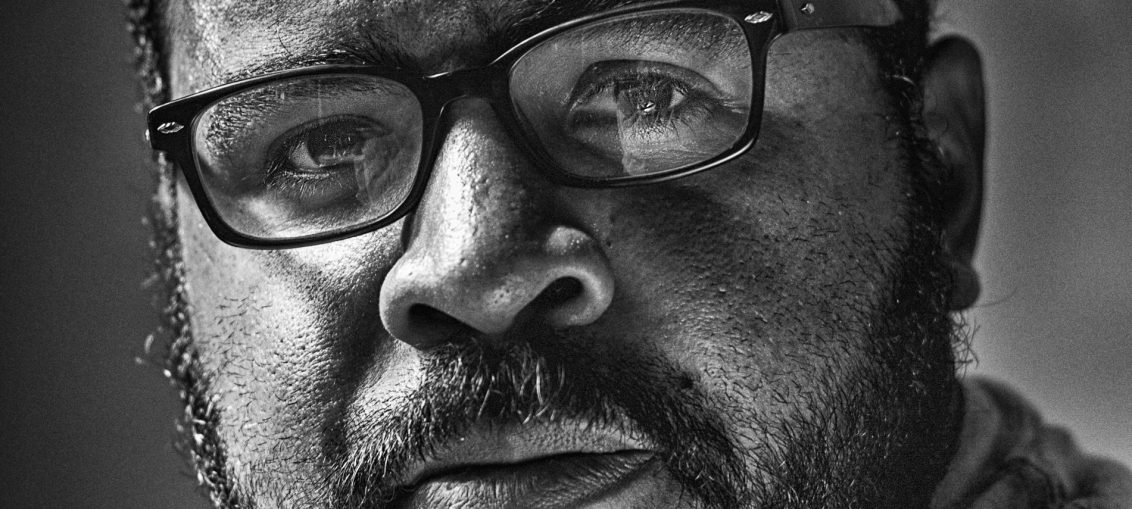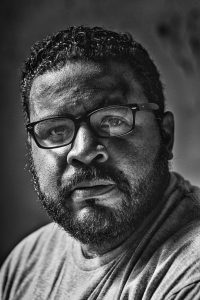
 Lico Whitfield
Lico WhitfieldIt was a powerful experience witnessing Gabriel Jason Dean’s production, “Triggered” presented by THE AMORALISTS – (“a diverse collective of uncompromising artists”). The show forms part of their 2018/2019 season entitled RICOCHET: An Amoralists Anthology about Surviving an American Epidemic, that features four original, intersecting plays that follow a community as it copes with the aftermath of a mass shooting. These four plays are being developed through their ‘Wright Club’ playwriting initiative where three writers tackle one unifying event. The three distinct perspectives are created by Gabriel Jason Dean, Charly Evon Simpson, and James Anthony Tyler. The season will also feature a series of original graphic novels created by Danica Novgorodoff. The fourth play will be collaboratively written by all three of the Wright Club authors.

The second play in the season is entitled STAINED and was written by Charly Evon Simpson. It has a limited run at New Ohio Theatre from October 4 -7, 2018
Producing Director of THE AMORALISTS, Lico Whitfield answered some of my burning questions about the company, The WRIGHT CLUB and their RICHOCHET Season.
Lico Whitfield you are the Producing Director – what baby steps and big leaps brought you into The Amoralist universe?
I came on board almost five years ago now. At that time the group had a really strong identity but was definitely growing and maturing. Within that first year various life events really made us question what the identity of the organization was and really accelerated that conversation. We always said “we weren’t doing this because we wanted to we’re doing this because we HAD to.” So, when we ultimately weren’t sure about the future of the group we just focused on the work we felt we had to do. That was around the time we started creating ‘WRIGHT CLUB’. Initially that was a bit of a gimmicky idea on my part but as a whole we really liked the idea of artists keeping artists accountable to their own standard of work. That was the work that really began to set the tone for the next few years.
What “triggered” you to dedicate your four-show season to the theme of gun violence?
We knew we wanted to use a series of plays that centered around the narrative of one incident. The goal was to collectively create a universe in which all of these stories occur and explore how one incident unifies all of these stories. James Kautz (Artistic Director) and I had pushed this narrative about military suicide patterns back and forth for a while and we introduced that to the group. We really felt that might pigeon-hole the narrative or require us to speak to a truth we felt distant from. Everyone was at least hesitant about that idea but we all felt strongly that the use of guns and our societal debate about their value was extremely resonant. The conversation quickly turned to the polarizing nature of the debate on this issue and it was one of those moments where we knew “this is what we HAVE to do.” When that feeling is that clear it really inspires confidence in the decision you’re making.
How do you go about choosing the 3 playwrights for the Wright club?
We asked people to submit to the program. Playwrights would submit a full-length play and a ten-minute play and we also asked them to complete a questionnaire. From there we selected a number of playwrights to interview and then narrowed it down to three playwrights. The whole process is really humbling because so many talented playwrights submitted so much incredible work. Just looking at the names of the people who submitted and it makes me think “THEY want to work with US?!” A lot goes in to the final decision, obviously, but I think what’s really key is we’ve always wanted to work with people who are willing to prove themselves wrong or present an imperfect truth. People who are willing to create stories that don’t have a resolvable argument and don’t define good or bad.
Do you have a core group of company members that fulfill the cast, creative and production roles?
Yes, there are about 10-12 of us that cover the production/producing roles. That includes a team of four designers. The casts have changed but the core producing/creative team remains intact.
Were all four shows written before the first one, “Triggered”, went into production?
No, collectively we created the elements of the story, the details of the singular incident; characters that would be created, a basic time-frame; and a suggested outline for the stories. Then each writer submitted a treatment for the story they wanted to write so we had a solid sense of the direction we would be going in terms of shared plot points or characters. From there each playwright began writing on their own time-frame based on our production calendar and their availability. The playwrights each have their own deadline for a final draft based on our production calendar but they can definitely keep making changes even after that point.
In your mission statement you say you are “confronting the American condition in all its complexity” and “no side emerges unscathed.” In this current politically chaotic, seismic eruption climate, how do you give voice to both sides? What do you think underpins the rampant gun violence/ mass shootings in the country?
Well, first of all, this isn’t the same as saying that “there’s good people on both sides.” I do think it’s important to acknowledge that America, and its various groups of citizens, are not a monolith. We lose sight of logical debate when we rely on “otherizing” ideas or values that don’t represent us individually. I don’t think we’re necessarily providing a voice for an opinion that isn’t ours but providing insight to the conflicting views we all have. The cognitive dissonance in so many of us that says “if gun violence is a problem than we should get rid of guns but if it remains to be a problem than I should have a gun.” That line of thinking seems to stem from a place of fear and anxiety and a society that deals with this issue on a regular basis is a society operating from fear and anxiety. I’m not sure if there’s a right or a wrong answer to be found there but I think it deserves reflection.
As to what “underpins the rampant gun violence?” I don’t think I’m really qualified to dissect that from a macro perspective but there is an alarming pattern of angry white men being disproportionately responsible for these incidents and perhaps that should really deserve much more attention.
The season is accompanied by the creation of a graphic/s novel by Danica Novgorodoff. Please tell me more about this process and where we can get our hands on a copy/copies?
Yes, the idea was to find a way to keep interested audience members engaged in between each play. The comic books are not necessarily designed to be a continued throughline of the plot but a companion piece. The comic is essentially another story that exists within the shared universe of all four plays but one that seems to live alongside them all as opposed to directly interacting with them. I feel it gives an audience member another perspective to the story, one that allows them to have a more introspective view on the incident in question. The full comics are available to our members and you can find out more about the memberships on our website (amoralists.com) Memberships can start as low as $2 a month. So if you’ve liked any one of the plays it’s definitely worth it.
I had the immense pleasure of seeing the first play of the season, “Triggered” by Gabriel Jason Dean at the Cherry Lane Theatre. It wasn’t opened to review. It is an exceptional work – can you expand on your reasons for the decision to keep it a little secret? Can we expect to see a longer run of these productions in the future? (Say yes, say yes!)
I’m not certain if we’ll remount any one of the plays. The reason they are not open to review is because we’ve really allowed the playwrights the opportunity to fine tune the play as long as they need. Given that we have such a compacted production schedule (we load in, tech, have 5 performances, and strike all in one week) it’s not really the most fair shot for a play or a playwright to get a review. We definitely want to honor and respect the ability of the playwright to finish their work the way they would prefer as opposed to rush anything for the sake of a review. That said, it was a really amazing production and I already have high hopes for the next one.
The fourth play in this series is going to be a collaboration by all playwrights and that will have a full production and be open to reviews.
Are you able to give us any more information about what we can expect from the next 3 plays in the season. Were the writers privy to the other playwrights work in process?
The second play is in production at the moment and it takes a deeper more personal look at a sort of survivor’s remorse. Really all of the plays are an introspection on what it means to live with PTSD as a society and how (if at all) individual survivors can actually move on. There are a lot of meditations on existence from a macro and micro perspective. If you look at the accompanying comics there is a lot of interplay between what it means for the world to exist in space and we dial that down to what it means to exist within a community and ultimately what it means to exist when your existence had become so vulnerable.
We haven’t gotten back in the room to discuss play four, which is designed to be a full collaboration between the three writers. I think the goal there is to examine the fragile nature of a society that has recognized its own vulnerability.
The Amoralists have been described as “explosive, vital, raucous and raw,” – how do you think you maintain your edge after all these years?
I think any “edge” we have these days is wild empathy. I think we’re constantly holding ourselves to a pretty high degree of empathy and truth. The voices we have brought to the table over the last few years have kept us as honest as we have asked them to keep themselves. I don’t know if that gives us an “edge” but it keeps us sharp.
“Explosive, vital, raucous, and raw.” Those characteristics are still there but as the work evolves they’ve come to represent something else, something deeper. The work is vital, certainly, but the notion of “explosive, raucous, raw” I think developed out of an “angry young man” phase of artistic development that was integral to developing a deeper level of empathy. I think those characteristics are now present in the voices and behavior of the characters we present because we’re constantly moving toward unresolvable conflict. We sort of live in the world of uneasy storytelling and self-confrontation over moral conflict. It’s pretty raw to call yourself out and recognize your own faults. I think we see that happen to our characters repeatedly.
How would you like these plays to continue the conversation around gun violence in the US?
Hopefully we all listen more. Certainly no one owns grief and without concrete solutions to this issue we’ll continue to encounter tragedies. Maybe if we really start listening to people’s fears and anxieties about this issue we can move closer to fact-based decisions as opposed to rhetoric.
Who are your mentors?
Well, I was really fortunate to learn a great deal from Kenny Leon and Todd Kriedler, both of whom worked closely with August Wilson for years. When I was much younger, Kevin Kittle, a teacher from the Esper Studio and at Rutgers, he’s an incredible stickler for the truth. It was really difficult to BS Kevin. He’s never on the internet but he’s had a huge impact on a ton of actors.
I know that Terry Kinney and Paige Evans have been terrific supporters of James as well.
What work in US or abroad is currently inspiring you or influencing your work?
Domonique Morrisseau is really killing the game. Skeleton Crew was one of the best plays in the last ten years. She really nails the dynamics of the complexity of American morality in a way that is remarkably resonant with our current climate. Martyna Majok is another writer that’s really capturing an important voice in American drama. I also love what Pig Iron in Philly is doing. I’m a big fan of mashing up the narrative of live music performance and theater making.
How have you personally shifted from being involved in this year’s season?
I think James and I are constantly shifting what we’re doing with the group. We’ve had some great support this past year that’s allowed us to move further away from doing everything from ticketing to performing (James performing, not me) and we’ve really grounded ourselves in creating the vision for this project, this 3rd season of ‘WRIGHT CLUB. We’re embedded in creative producing, story building for the comic, the overall artistic scope of the season, and the nitty gritty of general management. We’re still also getting on ladders and being our own crew (with help!) some things will probably never change.
For more information about The Amoralists and their 2018/2019 season visit their website: https://amoralists.com/
 Friday, December 26, 2025
Friday, December 26, 2025
Lovely interview!